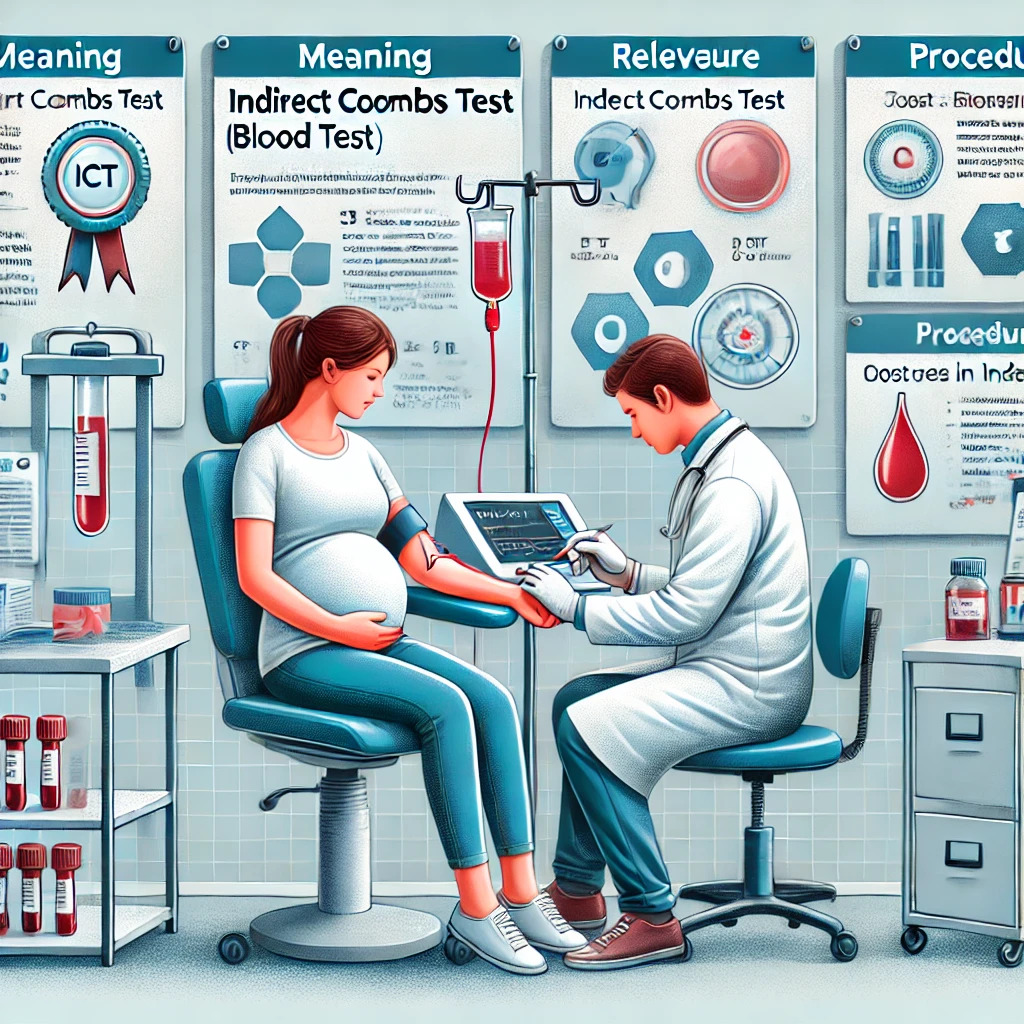ICT Blood Test in Pregnancy: Meaning, Relevance, Procedure, and Cost in India

For most people, becoming pregnant is an answer to their dreams and this journey is filled with joy, anticipation, and responsibilities. The most important thing during this journey is to ensure the well-being of both the mother and the baby. An important aspect of this care are the routine prenatal tests. Amongst these tests, the Indirect Coombs Test (ICT) holds special importance. This is a test which is designed to detect specific antibodies in the mother’s blood that could potentially harm the unborn child.
This blog sheds a light on what is the meaning of ICT blood test, how it is done, and what are the interpretations.
What Is the ICT Blood Test?
The Indirect Coombs Test is a blood test which is used to screen for antibodies in the blood plasma. This is important because when these antibodies are present, they can attack the red blood cells (RBCs) of the fetus. This can in turn lead to serious complications such as hemolytic disease of the newborn.
ICT blood test is particularly important in pregnancies where there is Rh incompatibility which means the mother’s blood type is Rh-negative and the baby’s blood type is Rh-positive. During pregnancy, small amounts of fetal blood may mix with the mother’s blood through the placenta. With Rh incompatibility, the mother’s immune system may perceive it as foreign and produce antibodies to destroy the Rh-positive blood cells of the baby. This can endanger the baby as it can cause severe anemia, jaundice, and in extreme cases stillbirth.
Why Is the ICT Blood Test Important?
As explained, this test is important to ensure a safe and healthy pregnancy. This is how:
It helps with early detection of Rh incompatibility and thus early preventive measures.
It helps in preventing hemolytic disease of the newborn. When the antibodies are detected early, it helps with timely treatments like Rh immunoglobulin.
It helps to monitor the antibody levels throughout the pregnancy which is critical for high-risk pregnancies where mother is already sensitized which means she already has antibodies.
It is useful for future pregnancies as it helps to determine whether the mother needs additional Rh immunoglobulin to prevent antibody formation in future pregnancies.
When Is the ICT Blood Test Performed?
It may be done in the first trimester to check the mother’s Rh status and if she already has antibodies.
It might be repeated around 28 weeks of gestation for Rh-negative mothers to ensure no new antibodies have developed during the pregnancy.
It may be done after delivery when the baby’s blood type is confirmed to be Rh-positive to check if additional Rh immunoglobulin is required.
How is the ICT Blood Test Done?
It is a minimally invasive test with no special preparations needed to take a blood sample. It only takes a few minutes and a small blood sample is drawn from a vein the arm using a sterile syringe. The laboratory then runs the test to check for the presence of antibodies. A negative test means that antibodies are not present and this is a good outcome. A positive test means the antibodies are present which will require further testing, interventions, or monitoring or all of these.
Preparation for the ICT Blood Test
This is a simple test where not much preparation is required but certain things can help. With such tests, it is important that you are providing complete and accurate medical history to the doctor where you mention any past pregnancies, blood transfusions, or known Rh incompatibility issues. For most blood tests, it is important that you stay hydrated as it helps with sample collection. If your doctor has given you any special instructions on avoiding any medicine, do follow those instructions. Always stay relaxed as anxiety can make it difficult for you to provide a sample. This is a minimally invasive test so you don’t have anything to feel anxious about.
Price Range for ICT Blood Test in India
The cost of Indirect Coombs Test in India depends on where you are getting the test from, location of the lab, etc. The price generally falls in the range of ?500 to ?2,000. Some diagnostic centers offer antenatal test packages which make these tests more affordable. At O-Lab in Jammu you can get the most affordable packages with the surety of accurate and timely reporting.
Implications of ICT Test Results: what do your results mean?
ICT test is a crucial test in pregnancy management and your doctor is the best person to interpret the results. But it is also important that you are well informed and understand its significance.
The negative ICT test means that antibodies are not present. This is a favourable outcome for Rh-negative mothers. They may be given Rh immunoglobulins as a preventive measure.
A positive ICT test means that antibodies are present in the mother’s blood. Close monitoring is required and this may also include tests like amniocentesis or Doppler ultrasound to assess the health of the fetus. Repeat ICT blood test may be done later in pregnancy. With identified Rh incompatibility, the doctor may administer Rh immunoglobulin to prevent formation of harmful antibodies.
Addressing Common Concerns About the ICT Test (FAQs)
What is the difference between the Direct and Indirect Coombs Test?
The Direct Coombs test is used in newborns or people with suspected hemolytic anemia where this test detects antibodies attached directly to red blood cells. On the other hand, the Indirect Coombs test checks for antibodies in the plasma. Indirect Coombs test is primarily used during pregnancy to screen for Rh incompatibility.
Can the ICT test prevent Rh incompatibility complications?
No, this test cannot directly prevent such complications but it does something really important. It enables timely preventive measures like Rh immunoglobulin injections which can significantly reduce risks of complications.
Can I undergo the ICT test if I’ve had a miscarriage?
Yes, as the test is an important tool to assess your Rh status and to prevent complications in future pregnancies.
Can the ICT blood test be done at any stage of pregnancy?
The test is generally done during the first trimester around 28 weeks but it can be done at any stage of pregnancy if required. It is also done after delivery in Rh-negative mothers.
Are Rh-negative mothers always at-risk during pregnancy?
This isn’t always the case as the risk exits only with a Rh-positive baby. Treatments like Rh immunoglobulin injections have reduced the risks with Rh incompatibility.
Is the ICT test necessary for first pregnancies?
Yes, this test is crucial to establish the mother’s Rh status which can further help in preventing complications in future pregnancies.
Does a negative ICT result mean I won’t need the test again?
No. even when the initial test result is negative, it is usually repeated around 28 weeks of pregnancy and after delivery to ensure that no new antibodies have developed.
Can the ICT test help with non-Rh-related antibodies?
Yes, this test has other uses. Although it is used to check for Rh incompatibility during pregnancy, ICT blood test can also detect other types of antibodies that may pose risks to the baby.
Can ICT results change during pregnancy?
Yes, this can sometimes happen. A mother can develop antibodies later in pregnancy due to sensitization events like any trauma, miscarriage, or improper management of Rh-negative pregnancies.
What follow-up tests might be needed after a positive ICT?
A positive ICT test is a major concern and follow up tests are required for safe management of the pregnancy. These can include amniocentesis to check the baby’s blood type, doppler ultrasound to monitor signs of anemia in the baby, and other tests. It is best left to the doctor to decide which tests are required here.
Is the ICT test relevant if both parents are Rh-negative?
No, because in this case the baby will also be Rh-negative which eliminates the risk of Rh incompatibility.
Conclusion
The ICT blood test in pregnancy is an important part of prenatal care especially in cases where mothers have a Rh-negative blood type. This test serves as a preventive measure for ensuring safe and healthy outcomes for both the baby and the mother. Treatments are available to prevent complications due to Rh incompatibility and this test helps to identify the issue at an early stage so that the treatment can be started early. By now you have a clear understanding of how this test can help in identifying and addressing potential risks associated with Rh incompatibility.
Thankfully for pregnant individuals in India, this test is widely available and affordable. It is a part of safeguards used in ensuring a smooth and healthy pregnancy journey. It is important to consult your doctor about which tests should be included in your antenatal care plan. Early detection is key to preventing complications in pregnancy and to promote the well-being of the baby. O-Lab in Jammu can be your trusted partner in the journey to a smooth pregnancy as it provides affordable tests at home and lab with accurate reporting.





